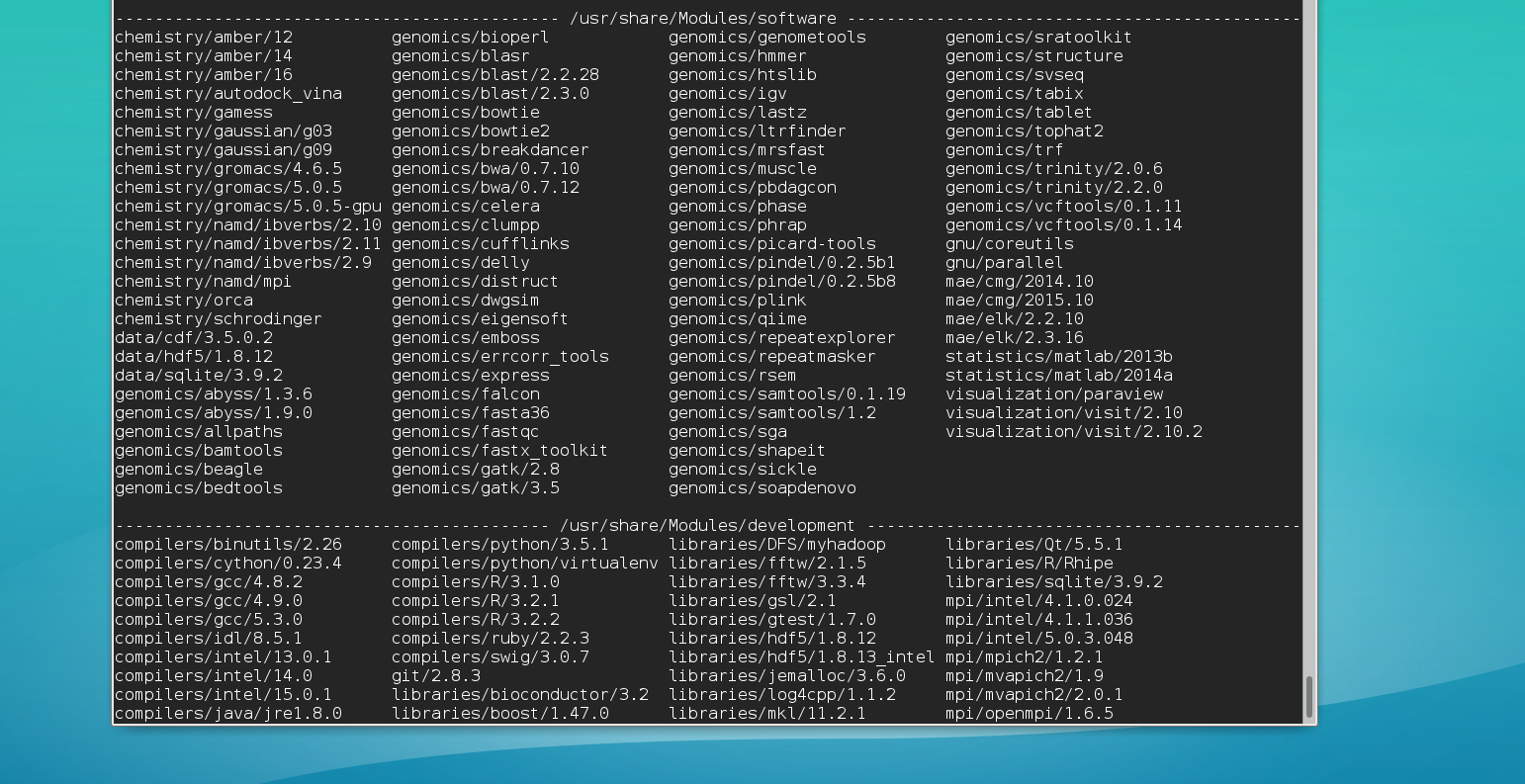Build Software
Setting up a Dynamic Environment
Learning Objectives
- Understand the need for a dynamic environment
- Learn to load and unload modulefiles
- Learn to write your own modulefiles
Pre-installed Modulefiles
List available modulefiles
$ module avail
Spruce Knob’s Available Modules Screen
Load a Modulefile
$ python3-bash: python3: command not found$ module load compilers/python/3.5.1
$ module listCurrently Loaded Modulefiles:
1) compilers/python/3.5.1$ python3Python 3.5.1 (default, Mar 10 2016, 10:56:02) [GCC 4.4.7 20120313 (Red Hat
4.4.7-16)] on linux
Type "help", "copyright", "credits" or "license" for more information.
>>> Unload a Modulefile
$ module unload compilers/python/3.5.1
$ module listNo Modulefiles Currently Loaded.$ python3-bash: python3: command not foundSearch for Modulefiles
By Category
$ module avail mpi--------------- /usr/share/Modules/development ------------------------------------
mpi/intel/4.1.0.024 mpi/intel/5.0.3.048 mpi/mvapich2/1.9 mpi/openmpi/1.6.5
mpi/intel/4.1.1.036 mpi/mpich2/1.2.1 mpi/mvapich2/2.0.1 mpi/openmpi/1.8.4What Modulefiles look like
$ module show compilers/python/3.5.1-------------------------------------------------------------------
/usr/share/Modules/development/compilers/python/3.5.1:
module-whatis Name: Python
module-whatis Version: 3.5.1
module-whatis Category: Scripting Language Intrepeter
module-whatis URL: http://www.python.org
module-whatis packages: setuptools-18.2
conflict compilers/python/2.7.3 compilers/python/2.7.10
prepend-path PATH /shared/software/python/python-3.5.1/bin
-------------------------------------------------------------------What is command
$ module whatis compilers/python/3.5.1compilers/python/3.5.1: Name: Python
compilers/python/3.5.1: Version: 3.5.1
compilers/python/3.5.1: Category: Scripting Language Intrepeter
compilers/python/3.5.1: URL: http://www.python.org
compilers/python/3.5.1: packages: setuptools-18.2Internal search of modulefiles
$ module apropos -i setuptoolscompilers/python/2.7.10: packages: Numpy 1.9.2, Matplotlib 1.4.3, Setuptools 18.3.1
compilers/python/3.5.1: packages: setuptools-18.2Writing private module files
Modulefiles can be written by users so they can control their own environments.
Modulefiles are very simple to write. Usually, you just want to add a directory to your PATH variable. We want to write a modulefile to use our python3 interpreter; which consists of adding $HOME/python3/bin to our PATH variable. This is done with the prepend-path directive in modulefiles.
$ cat python3#%Module
prepend-path PATH /home/training01/python3/binPersonal modulefiles need to be located in a subdirectory privatemodules in your home directory.
Load your personal private modulefiles
$ module load use.ownYou can now see your personal modulefiles in the module avail command.
$ module avail---------------------- /home/training01/privatemodules -------------------------------
python3We can load the python3 modulefile, and verify that it works correctly.
$ python3-bash3: python3: command not found$ module load python3
$ module listCurrently Loaded Modulefiles:
1) use.own 2) python3$ which python3/home/training01/python3/bin/python3